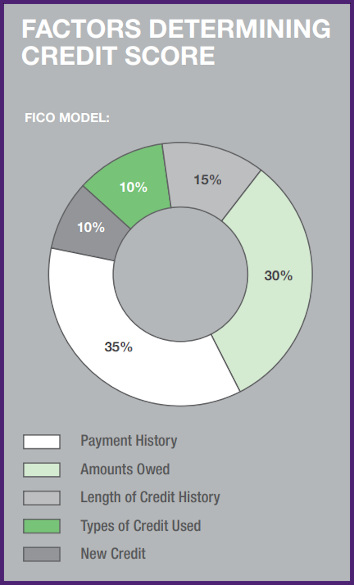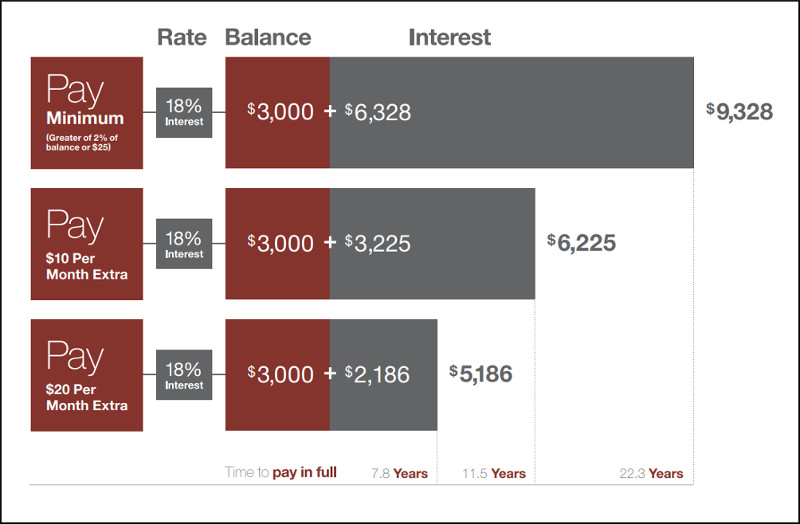Using Credit Wisely
As a Financial Tool, Credit...
- Allows you to pay for things you could not afford with cash, such as a college education, new vehicle, or your first home.
- Helps you build a credit reputation — summarized in a credit report — that employers, landlords, future lenders, and other businesses often consider as they make decisions about you.
- Can also be dangerous if misused. Some individuals falsely view credit as a license to spend. In addition, poor spending habits can leave them deeply in debt and damage their credit reputation for years to come. Begin your journey to understand credit by clicking the button below.


Using Credit Wisely
As a Financial Tool, Credit...
- Allows you to pay for things you could not afford with cash, such as a college education, new vehicle, or your first home.
- Helps you build a credit reputation — summarized in a credit report — that employers, landlords, future lenders, and other businesses often consider as they make decisions about you.
- Can also be dangerous if misused. Some individuals falsely view credit as a license to spend. In addition, poor spending habits can leave them deeply in debt and damage their credit reputation for years to come. Begin your journey to understand credit by reading the four tips below.

Understand Credit

Practice Healthy Credit Habits
Using credit responsibly can help boost your overall financial well-being. Here are some tips to establish a healthy credit reputation:
- Set up and follow a budget so you don't accidentally run up debt.
- Pay bills on time. Do not skip payments.
- Pay off credit cards in full each month. If you must carry a balance, keep it as low as possible.
- Do not apply for credit you do not need.
- Keep credit card and loan information in a safe secure place to reduce the risk of identity theft.
- Keep your receipts and compare charges when your billing statements arrive. Call your company immediately if there is a discrepancy.

Monitor Your Credit Report
Your credit report is a record of your payment history with creditors. It is this report that employers, lenders, landlords, insurers and other businesses often evaluate to make decisions about your creditworthiness.
It shows the following:
- How much credit you are using
- How well you pay your debts
- Who is inquiring about your credit
- Information on bankruptcies or federal income tax liens
You can request your free annual credit report through the Annual Credit Report Request Service, a centralized contact point created by the three nationwide consumer reporting agencies: Equifax, Experian and TransUnion. Review your credit report annually for accuracy and any changes that may indicate fraudulent activity.
Many members of the military now have access to free electronic credit monitoring which may alert you to mistakes or problems with a credit report stemming from unauthorized use. Click on the "Free Credit Monitoring" PDF below for more information.
In reviewing your credit score, if it is high enough, you may qualify for the best rate on a loan or credit card account. A low score may cause you to be denied credit. Depending on the credit scoring model, scores may range from 300 to 850. Most lenders consider scores above 660 to be a good credit risk, while scores below 600 may indicate credit problems.
No single factor determines your score. But one or more of the factors may affect the final score more than others, depending on the overall information in your credit report.
Your score today could be different from your score three months from now. Ordering a copy of your own credit report or credit score does not impact your score.
Lenders use different credit scoring models depending on the type of credit for which you are applying. Still, you can obtain an educational score from any number of sources (sometimes for a fee) to give you a directional snapshot.

Choosing a Credit Card
Credit cards get a lot of people into deep financial trouble. However, if you use them well, credit cards can also have a positive impact on your financial life. Here are some guidelines to keep in mind if you open a credit card account:
- Minimize Rates and Fees: Search for a card with no annual fee and low interest rates. Beware of low introductory rates that balloon after a time. Always check the rates of competing credit card companies. There may be a better option for you in the long run.
- Always Have a Plan: Even though it doesn't take much thought to simply reach for your card and pay for things, don't ever use your card without thinking first.
- Avoid Cash Advances: Most credit cards charge high interest on cash advances as soon as they post to your account. It's best to avoid using this feature.
Finally, don't use a credit card as a license to spend now and pay later. Credit cards should typically be used for convenience and safety. Avoid the temptation to spend money you don’t have.

Paying the Minimum Is Costly
Try to pay more than the minimum. In the following illustration, paying the minimum each month will take approximately 22 years to pay off the balance. In fact, it will actually cost you more than twice the original charge. Increasing what you pay by as little as $10 or $20 each month will make a huge difference. Just by paying a little more each month, you can save thousands of dollars in interest costs and cut years off your repayment time. To understand credit even better, analyze the chart below.

MilLife Milestones
Watch





Dig Deeper




Understand Credit

Practice Healthy Credit Habits
Using credit responsibly can help boost your overall financial well-being. Here are some tips to establish a healthy credit reputation:
- Set up and follow a budget so you don't accidentally run up debt.
- Pay bills on time. Do not skip payments.
- Pay off credit cards in full each month. If you must carry a balance, keep it as low as possible.
- Do not apply for credit you do not need.
- Keep credit card and loan information in a safe secure place to reduce the risk of identity theft.
- Keep your receipts and compare charges when your billing statements arrive. Call your company immediately if there is a discrepancy.

Monitor Your Credit Report
Your credit report is a record of your payment history with creditors. It is this report that employers, lenders, landlords, insurers and other businesses often evaluate to make decisions about your creditworthiness.
It shows the following:
- How much credit you are using
- How well you pay your debts
- Who is inquiring about your credit
- Information on bankruptcies or federal income tax liens
You can request your free annual credit report through the Annual Credit Report Request Service, a centralized contact point created by the three nationwide consumer reporting agencies: Equifax, Experian and TransUnion. Review your credit report annually for accuracy and any changes that may indicate fraudulent activity.
Many members of the military now have access to free electronic credit monitoring which may alert you to mistakes or problems with a credit report stemming from unauthorized use.
In reviewing your credit score, if it is high enough, you may qualify for the best rate on a loan or credit card account. A low score may cause you to be denied credit. Depending on the credit scoring model, scores may range from 300 to 850. Most lenders consider scores above 660 to be a good credit risk, while scores below 600 may indicate credit problems.
No single factor determines your score. But one or more of the factors may affect the final score more than others, depending on the overall information in your credit report.
Your score today could be different from your score three months from now. Ordering a copy of your own credit report or credit score does not impact your score.
Lenders use different credit scoring models depending on the type of credit for which you are applying. Still, you can obtain an educational score from any number of sources (sometimes for a fee) to give you a directional snapshot.

Choosing a Credit Card
Credit cards get a lot of people into deep financial trouble. However, if you use them well, credit cards can also have a positive impact on your financial life. Here are some guidelines to keep in mind if you open a credit card account:
- Minimize Rates and Fees: Search for a card with no annual fee and low interest rates. Beware of low introductory rates that balloon after a time. Always check the rates of competing credit card companies. There may be a better option for you in the long run.
- Always Have a Plan: Even though it doesn't take much thought to simply reach for your card and pay for things, don't ever use your card without thinking first.
- Avoid Cash Advances: Most credit cards charge high interest on cash advances as soon as they post to your account. It's best to avoid using this feature.
Finally, don't use a credit card as a license to spend now and pay later. Credit cards should typically be used for convenience and safety. Avoid the temptation to spend money you don’t have.

Paying the Minimum Is Costly
Try to pay more than the minimum. In the following illustration, paying the minimum each month will take approximately 22 years to pay off the balance. In fact, it will actually cost you more than twice the original charge. Increasing what you pay by as little as $10 or $20 each month will make a huge difference. Just by paying a little more each month, you can save thousands of dollars in interest costs and cut years off your repayment time. To understand credit even better, analyze the chart below.

MilLife Milestones
Watch





Dig Deeper


Recent Blogs
5 Financial Resolutions to Start the New Year Off Right
You don’t need to wait until January to take a fresh look at your finances. Get a jump on the new year with these five resolutions — they can really pay off over the next 12 months. 1. Set/update your budget Setting a budget is the first step in a military family’s financial planning. And…
Read More5 Financial Power Moves for MilSpouses
During National Veterans and Military Families Month in November, we salute the strength of our families as they support the mission of our community. MilSpouses, especially, display determination as they face the challenges of military life. We see you navigate frequent moves, deployments and often raising children as a solo parent. We understand your motivation…
Read MoreThe Year In Review: Bring Your Financial Picture into Focus
It can be fun and even eye-opening to watch those year-end montages reminiscing about the year. If you ever have that moment when you say to yourself, “Wait, that was this year?”, you could also imagine how easy it could be to lose track of the goals and financial plans you set in motion when…
Read MoreNow’s the Time to Think About Life Insurance
Hey, MilSpouses, it’s Life Insurance Awareness Month! Okay, so maybe that doesn’t make you want to break out the cake and ice cream, but life insurance is an important part of your financial plan. It can help take care of your family, giving them financial security if something happens to you or your service member.…
Read MoreBudget and Insurance: What to Do After You PCS
After months of planning and hard work, you’ve landed safely at your next duty station. Congratulations! As you kick off this next chapter in your MilLife, it’s a good time to check in on your finances. Let’s look at two key items that are likely to change after a PCS: your budget and your insurance.…
Read MoreInsurance and Estate Planning for Your Peace of Mind
Insurance protection and estate planning are key to your family’s financial peace of mind. Insurance protects you from serious financial loss and provides for your family, and estate planning ensures your wishes are carried out in case you are no longer there. Protect Your Stuff Homeowners and Renters Insurance: Both homeowners and renters insurance cover…
Read MorePCS Finances for MilSpouses: In Their Own Words
Did you set financial goals earlier this year only to have a permanent change of station (PCS) threaten to derail your family’s budget? You’re not alone. Other MilSpouses have learned how to keep their family finances intact during a move — and so can you! Here is valuable advice from their experiences. PCS-proof Your Finances…
Read MoreShowing Appreciation with Top Resources for MilSpouses
As MilSpouses, we are often asked to shoulder a big load of responsibility. When partners deploy or work long hours, managing career and home responsibilities — especially finances — can fall on us. May 10 is Military Spouse Appreciation Day, and we pause to honor your unwavering support, strength and resiliency in all you do…
Read More










